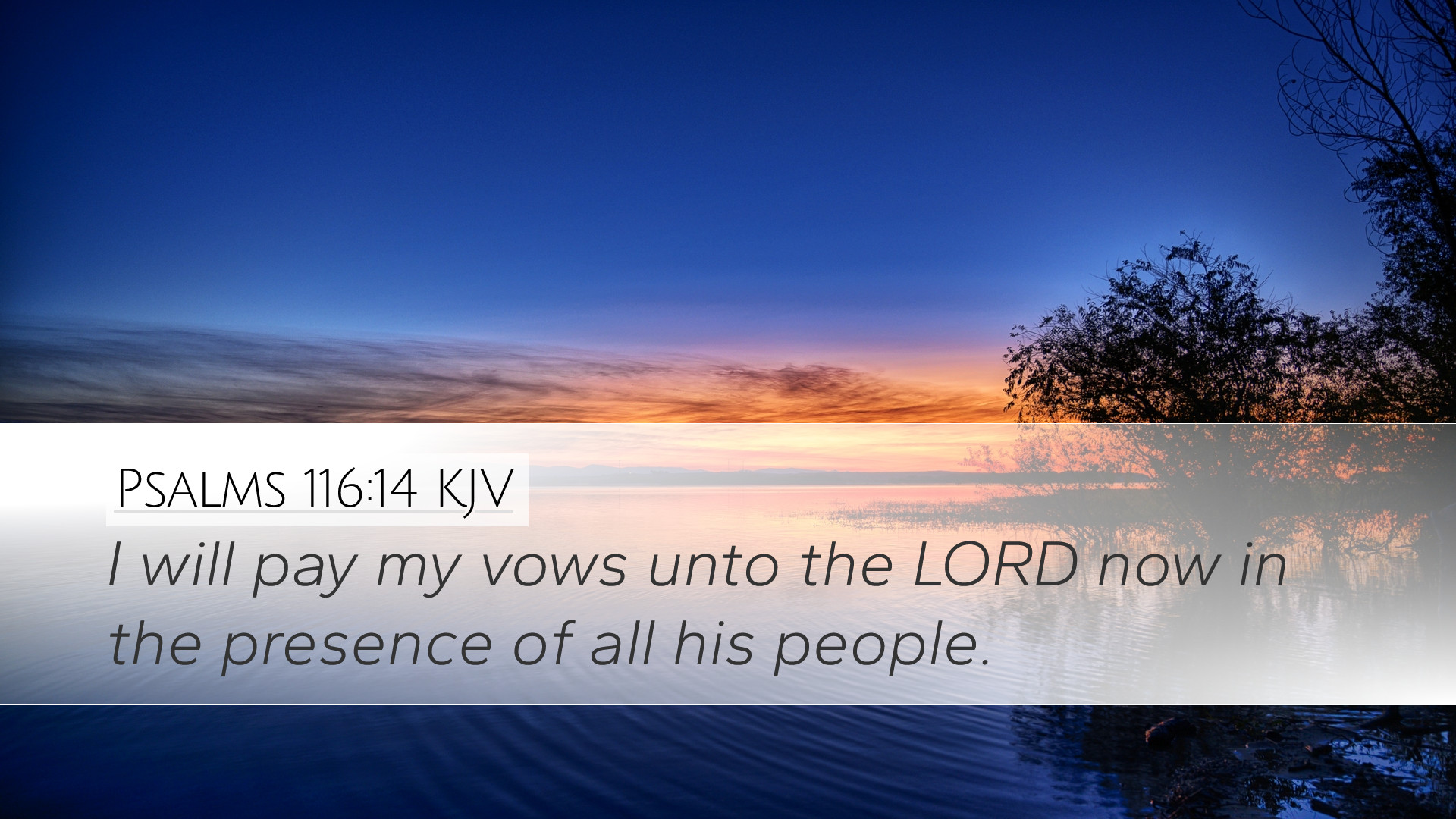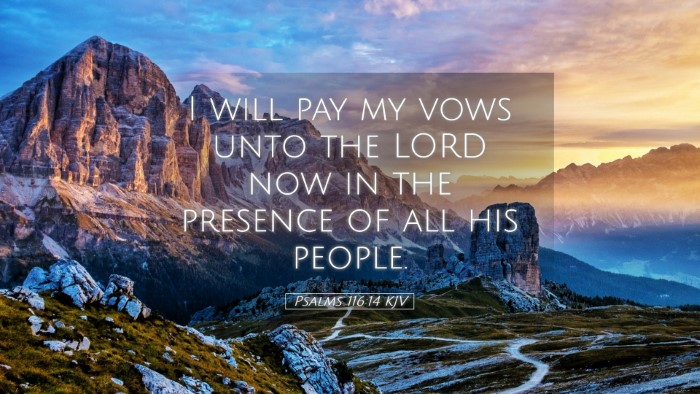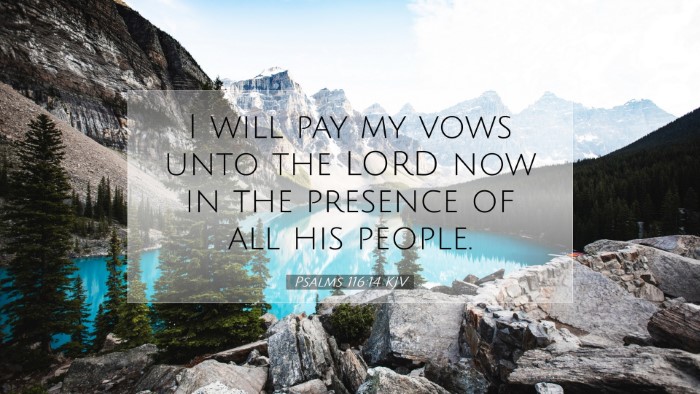Psalms 116:14 Overview
Psalms 116:14 states, "I will pay my vows unto the LORD now in the presence of all his people." This verse encapsulates a commitment made by the psalmist, expressing a deep sense of gratitude and dedication to God after experiencing deliverance from distress.
Contextual Background
The Book of Psalms serves as a rich tapestry of poetry, prayers, and hymns drawn from various moments in the life of Israel. Psalm 116 is classified as a thanksgiving psalm, where the psalmist recounts a personal experience of peril, closely aligned with communal worship. The psalm not only reflects individual salvation but also reinforces the communal aspects of worship and the importance of fulfilling vows made to God.
Insights from Commentaries
Matthew Henry's Commentary
Matthew Henry remarks that this verse highlights the psalmist's intention to clear the debt incurred by his vows, indicating a serious obligation to God’s service. He notes that the act of "paying vows" signifies a movement from mere promise to fulfilled commitment, reinforcing that our relationship with God should be characterized by faithfulness.
Henry elucidates on the phrase "in the presence of all his people," suggesting that this public acknowledgment serves not only to glorify God but also to be an example to others. It emphasizes the importance of accountability within the faith community; that public faith declarations can inspire and encourage communal faithfulness.
Albert Barnes' Notes on the Bible
According to Albert Barnes, the psalmist expresses a determination to honor his promises, indicative of a heart genuinely transformed by God’s grace. He interprets “vows” as deeply personal commitments that arise from the deliverance and mercy experienced in one's life.
Barnes also emphasizes that the fulfillment of vows takes place "now," highlighting the immediacy and urgency of responding to God’s goodness. This acknowledgment underscores the need for timely obedience—when one experiences God's blessings, it is imperative to recount them and fulfill one’s commitments.
Adam Clarke's Commentary
Adam Clarke provides additional context regarding the nature of the psalmist's vows. He states that during times of distress, individuals often make promises to God as a form of bargaining for deliverance. Clarke interprets the fulfillment of these vows as essential to spiritual integrity and authentic worship.
Clarke further notes the communal setting of this declaration, drawing attention to the importance of worshiping God alongside others. This communal aspect suggests that personal deliverance is also a catalyst for the collective worship and encourages the community to join in recognizing God's faithfulness.
Theological Implications
Psalms 116:14 invites deeper reflection on several theological themes:
- Divine Deliverance: The foundational premise of the psalmist’s vow rests on experiencing God's saving power. It highlights a biblical understanding of salvation as both personal and communal.
- Faithfulness: The commitment to pay vows points toward the essential character trait of faithfulness that God expects from His followers. It speaks to the importance of integrity in one’s spiritual life.
- Public Witness: The declaration made "in the presence of all his people" emphasizes the idea of a public testimony. It conveys that personal faith is not just an individual experience but a testimony that benefits the broader community.
- Community Responsibility: By making vows in a communal context, the psalmist acknowledges that faith is communal rather than isolated. This serves as a reminder to the church of their collective journey in faith.
Practical Applications for Ministry
For pastors and ministry leaders, Psalms 116:14 can serve as a foundation for teaching about the significance of vows and commitments made to God. Several practical applications emerge:
- Encourage Accountability: Just as the psalmist openly committed to his vows, believers today can benefit from accountability in their spiritual commitments. Establishing small groups or prayer partners can enhance this accountability and mutual encouragement.
- Create Opportunities for Public Testimonies: Providing platforms for congregants to share their experiences of deliverance or answered prayers can reinforce the communal narrative of faith and inspire others.
- Teach on the Importance of Fulfillment: It is essential to convey the seriousness of fulfilling promises made to the Lord. Teach members the scriptural basis for honoring their commitments, fostering a culture of integrity within the congregation.
- Model Gratitude and Praise: Leaders should frequently express gratitude for God’s deliverance in their own lives, modeling the practice of paying vows and inspiring a culture of thankfulness in the congregational life.
Conclusion
Psalms 116:14 resonates with the core tenets of the believer's walk with God and serves as a reminder of the necessity of fulfilling our commitments to Him. This verse encapsulates a profound acknowledgment of God's faithfulness and an enthusiastic response in public worship. As we delve into this text, may we be inspired to reflect on our own vows and commitments to the Lord, encouraging one another in our shared faith journey.


